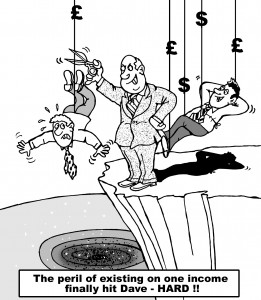 My wife just got back (well, just before our Noosa trip) from a trip overseas to attend her nephew’s wedding; and, the young happily married couple decided to spend part of their honeymoon in Australia … so, they are staying with us right now!
My wife just got back (well, just before our Noosa trip) from a trip overseas to attend her nephew’s wedding; and, the young happily married couple decided to spend part of their honeymoon in Australia … so, they are staying with us right now!
This was an opportunity for me to interfere in their financial lives … naturally, I couldn’t resist 😉
It’s also an opportunity for me to share my financial plan for our younger readers, whether single or married.
The plan is simple:
Step 1: Start working!
Step 2: Use your pre-work spending and living standards as a guide to ensure that you save at least 10% of your gross salary; preferably more.
Step 3: No matter what your Step 2 Income and Expenditure, save at least 50% of any future salary increase
Step 4: That includes any ‘found money’ such as: change found on the street; tax refund checks; small handouts/inheritences from friends/family (naturally, you will ‘up this’ to saving 95% of any LARGE handout/inheritence); etc.
It won’t take too long to actually have some money (perhaps for the first time in your life) to think about actually INVESTING.
So, what to invest in? Stocks; car parks; italian art; … ?
It’s simple: your own home!
It will probably be a small house or condo to start with … possibly with some ‘fixer upper’ potential …
But, what about the 20% Equity Rule and the 25% Income Rule, which will ensure that you can only afford to buy a shoe-box (literally) at this early stage of your financial life?
You forget them for your first home …
… and, replace them with these guidelines:
– Put as much equity into your house (by way of making a deposit) as you have savings (you’ll want to keep a little buffer against immediate expenses)
– Borrow as much as the mortgage payment that you can afford, which will be the amount per month that you are currently saving (of course, you’ll want to keep a little buffer against extra expenses).
When you (eventually) get tempted to ‘trade up’ to a bigger house, that’s when you apply the 20% Rule and the 25% Income Rule!
But, shouldn’t you invest in something else first? Perhaps you’re not even married yet and can happily rent for a while?
This is true: but, buy the condo anyway … then you can evaluate if your rent is so cheap that you should rent out the condo for a while before moving into it. Same applies if you move to another location: rent out the house/condo and rent for yourself elsewhere until you are ready to trade up (or across).
Why?
Let’s decide whether, over the course of your life, real-estate will go up in price or down in price? The answer for all of history has been UP (over a sufficiently long period).
Decide whether you will ever want to own your own residence? Again, the answer is YES for the overwhelming portion of humanity (and, even if you think not, I guarantee that your eventual spouse will have a very hard go at convincing you otherwise).
So, unless you have an overwhelming reason to believe that RE won’t go up in price for the next X month/years, then you are compounding your money at RE’s typical growth rate (6% … depending upon who you believe and where you live) TIMES the leverage that the bank is giving you LESS (your mortgage payment/costs – rent you would have otherwise paid).
Run the numbers; it’s a VERY good/safe rate of return 🙂






 I was just rereading
I was just rereading 

 In fact, ‘urban legend’ has Albert Einstein calling compounding “the most powerful force in the Universe” … urban legend because Einstein would never have called such a relatively [pun intended] slow geometric progression ‘powerful’ when he had nuclear reactivity to play with (a far quicker and more dramatic form of compounding).
In fact, ‘urban legend’ has Albert Einstein calling compounding “the most powerful force in the Universe” … urban legend because Einstein would never have called such a relatively [pun intended] slow geometric progression ‘powerful’ when he had nuclear reactivity to play with (a far quicker and more dramatic form of compounding).